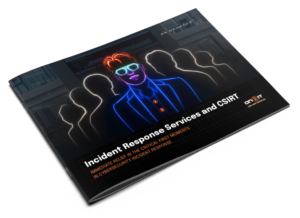In the digital age, where the fabric of our interconnected world is woven with threads of data and technology, the imperative for cyber resilience has never been more urgent.

Today’s enterprise architectures stand at a crossroads, facing a storm of targeted cyberattacks that threaten not only their systems, but also the very essence of their existence.
The risk factors converging to create this perfect storm are as multifaceted as they are ominous, painting a picture of an uncertain future fraught with challenges and dangers.
The rise of political uncertainties and economic instability amplifies the potential fallout of cyberattacks, which can cripple operations, erode trust, and destabilize economies on a scale we’ve never witnessed before.
Amidst the growing geopolitical tension that casts shadows over global relationships, enterprises must navigate the treacherous waters of a world in flux. The rise of political uncertainties and economic instability amplifies the potential fallout of cyberattacks, which can cripple operations, erode trust, and destabilize economies on a scale we’ve never witnessed before.
As if on cue, cyber criminals have seized the opportunity presented by these tumultuous times, launching attacks with unprecedented volume, sophistication, and impact. The digital realm, once heralded as a beacon of progress, is now a battleground where criminal actors harness powerful AI and tools as accelerants, escalating the risks to unprecedented heights.
DDOS In 2024
DDoS attacks are becoming increasingly more frequent, and there doesn’t appear to be any signs of slowing down. What type of attacks are used and what are the best prevention and remediation methods?
Join Luca Cipriano, Lieuwe Jan Koning and Peter van Burgel as they take a deep dive into threats surrounding DDoS attacks:
Mirai botnet
HTTP/2 rapid reset
Reflection and Amplification DDoS attacks

Yet, in the face of these ominous clouds, a silver lining emerges in the form of cyber resilience. It’s not just about fortifying our infrastructure to withstand attacks; it’s about fortifying the very DNA of an enterprise, instilling the ability to rebound, adapt, and thrive in the face of adversity.
The clarion call for cyber resilience is reverberating across industries, echoing the need to proactively build a bastion that can weather the storm, emerge stronger, and, in defiance of uncertainty, ensure business continuity.
…an investment in cyber resilience isn’t just a prudent measure; it’s a strategic decision that safeguards their future.
As we examine this landscape, it becomes evident that cyber resilience isn’t just an optional addendum to the modern enterprise playbook—it’s a non-negotiable imperative. The world’s leading organizations are embracing this paradigm shift, recognizing that an investment in cyber resilience isn’t just a prudent measure; it’s a strategic decision that safeguards their future.
Consider the actions taken by the likes of the White House, US Congress, SEC, and CISA. These formidable entities are championing cybersecurity best practices, providing a blueprint for organizations to follow suit. They advocate for the adoption of Zero Trust—a concept that encapsulates a radical yet necessary shift in approach.
The essence of Zero Trust lies in its maxim: “Never trust, always verify.” It’s about rewriting the rules, overturning assumptions, and reimagining security from the ground up.

The journey towards cyber resilience is a deliberate one—a symphony of strategy, alignment, execution, and measurement. The Zero Trust strategy serves as a compass and lodestar, guiding organizations on a path that transforms their critical assets into protect surfaces.
The metamorphosis doesn’t stop at technical measures; it extends to the very core of an organization’s ecosystem. It empowers businesses to transcend silos and collaborate holistically, ensuring that every facet of their operations is fortified.
Cyber resilience is not a luxury or a “nice-to-have” feature; it’s the foundation upon which modern enterprises must build their futures.
Imagine an enterprise landscape where cybersecurity isn’t just a reactive measure; it’s a proactive stance. Zero Trust isn’t just a technology-driven concept; it’s a cultural ethos that permeates every decision, every interaction, and every layer of an organization.
It’s an investment that pays dividends in the belief that, armed with the right strategy, an organization can not only survive but also thrive.
Cyber resilience is not a luxury or a “nice-to-have” feature; it’s the foundation upon which modern enterprises must build their futures.
The Zero Trust strategy isn’t just a tactical maneuver; it’s a powerful strategic weapon that empowers organizations to write their own narrative in the face of adversity. The future belongs to the resilient—the ones who refuse to bow down to uncertainty and instead stand tall, fortified, and resolute in the face of the digital tempest.


